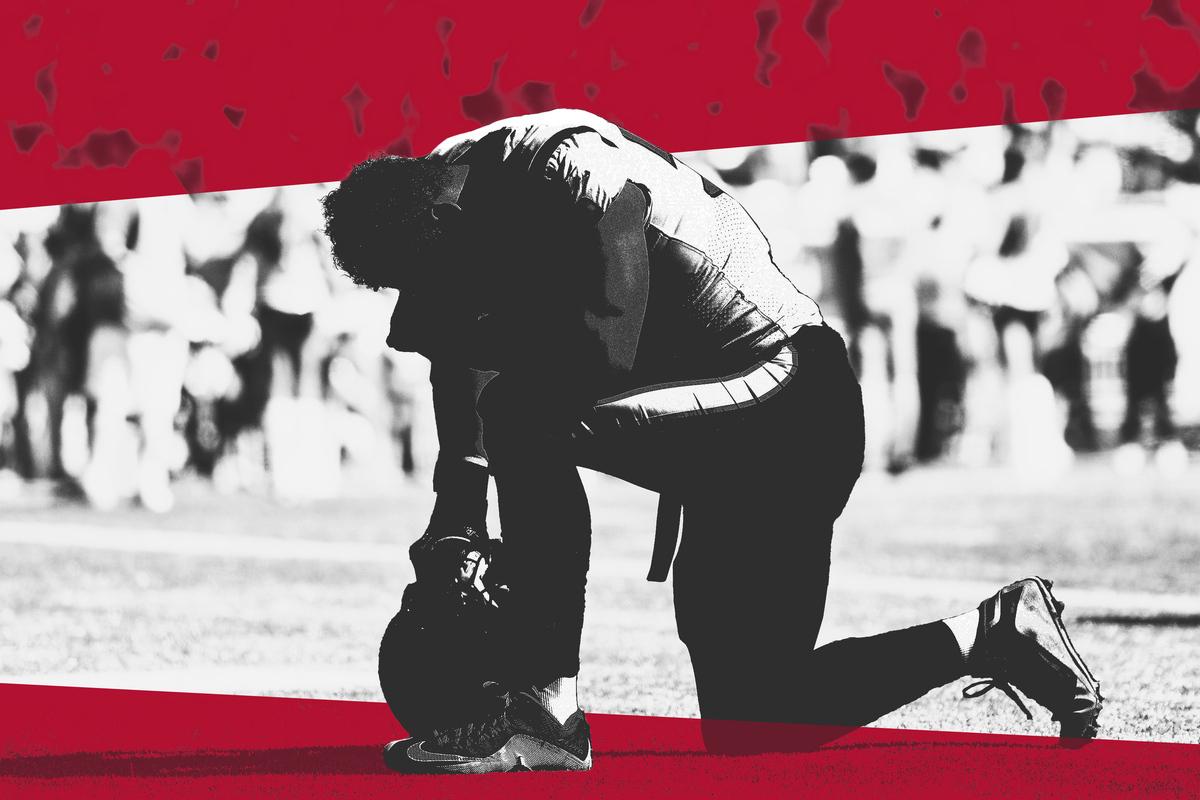
In 1933, NFL owners secretly banned Black players from the league. Thirteen years later, four Black men—Kenny Washington, Woody Strode, Bill Willis, and Marion Motley—reintegrated pro football. The Forgotten Four broke the race barrier in professional football one year before Jackie Robinson’s historic, and widely recognized, debut in Major League Baseball.
In Blackballed, a new four-part audio documentary on the Ringer NFL Show feed, we’re telling their story and exploring how it can help us understand the league’s complicated relationship with race in the present day. Below is an excerpt of Episode 4, “A Seat at the Table.” Listen to Episode 1 here, Episode 2 here, and Episode 3 here.
After the Forgotten Four broke the color barrier in pro football, what happened was a very slow, and very incomplete, move away from the all-white gentlemen’s agreement league. Even after the end of segregation in the ’40s, the game wasn’t exactly “open” to Black players.
Today, things might look like they’re trending in a different direction. At the start of last season, 11 NFL teams started a Black quarterback—that’s the highest Week 1 number ever. And two Black quarterbacks faced each other in the Super Bowl in February: Patrick Mahomes and Jalen Hurts.
But it took almost six decades to get there, and if you look at the men who are leading the teams—especially the head coaches—the numbers are arguably even more damning.
Jim Trotter, a reporter who has worked for the NFL Media Group for the past five years, lays it out. “The stat that blows my mind when you put it in a broader context is this,” he says. “The first Black head coach in the NFL was Fritz Pollard in 1921. So here we are, 102 years later, and the NFL has only three head coaches who identify as Black. Think about that. Over a hundred-plus years, we’ve increased the number of head coaches, Black head coaches, by two, from one to three.”
The first coach Trotter mentioned—Fritz Pollard—was the head coach of the Akron Pros a dozen years before the gentlemen’s agreement banned Black players in 1933. Today, his name graces the Fritz Pollard Alliance, the group most identified with supporting minority hiring in the NFL’s coaching ranks.
The three Black-identifying head coaches Trotter mentioned are Mike Tomlin, DeMeco Ryans, and Todd Bowles. Three out of 32. “If that’s not damning, I don’t know what is,” Trotter says. “We’re talking about a century here where we really have made no progress.”
At a news conference just before the Super Bowl in 2022, Jim laid out some numbers for commissioner Roger Goodell: He listed 13 teams that had never, at that point, had a Black head coach. He stated that there’s never been a Black majority owner. And he pointed out that while there was only one Black team president, there were seven Black GMs, but five had just been hired in the previous year. Jim’s list kept going—he talked about head coaches, executives at the NFL, and especially the lack of representation in the NFL media properties’ newsroom leadership.
And then he made a crucial comparison: The league’s player population is 70 percent Black.
Jim then asked Goodell this question: “So as a member of the media group and as a Black man, I ask why does the NFL and its owners have such a difficult time at its highest levels hiring Black people into decision-making positions?”
Jim brought it up again before this year’s Super Bowl, noting, “I asked you about these things last year, and what you told me is that the league had fallen short and you were going to review all your policies and practices to try and improve this. And yet a year later, nothing has changed.”
“We have reviewed everything we have been doing across the league,” Goodell responded last month. “And we are looking at everything from vendors that we are working with to partners we are working with to ownership, where we’ve seen significant changes in diversity just this year. … I am comfortable that we have made significant progress across the league.”
This is the same thing I’ve heard over the last several years, whenever the topic of employment of Black people comes up. But what Jim wants to see—what I want to see—are actions. Real change.
Like Trotter said, only three Black-identifying head coaches in the NFL? It’s far from enough. And it’s not like there aren’t enough candidates—Black assistant coaches have been struggling to get hired for head coaching jobs for a long time.
We still see it all the time today, as Black coaching candidates—like Eric Bieniemy and Steve Wilks—are passed over time and time again.
“All I want is for the company that I work for to be its best self,” Trotter says. “And that is not happening. And for you to use performative gestures such as ‘End Racism’ in the end zone or ‘Black Lives Matter’ on the back of a helmet or to sing the Black national anthem, to me, that’s not progress. Progress is seeing people who look like me at the highest levels of the NFL in decision-making positions so that when subjects are being discussed about a league whose player population, according to league data, is 60 percent to 70 percent Black, that there is representation at that table. And right now, there is not.”
But Jim says that something significant has changed since Colin Kaepernick took a knee: “What I do know is that if it is something that affects Black people across the spectrum, that I do know that players now feel more comfortable saying, ‘We’re not going to stand for it.’”
It’s another way to think about progress. Imagine NFL team owners listening to the players who make them all that money.
I should note here that, just days before this episode went live, Jim Trotter announced on Twitter that his time at the NFL Media Group was up. He was informed just last weekend that his contract would not be renewed. In his tweet, he thanked the NFL Network and the website for “the lessons learned and affirmed over the last five years.”
NFL Media did not respond to a request for comment in time to include it here.
I reached out to Jim to ask if he wanted to say anything else in light of his news. Here’s what he wrote back: “As a journalist, it is critically important to make sure that the actions of those in power reflect their words.”
This excerpt has been lightly edited for clarity. To hear the entire episode click here, and subscribe to The Ringer NFL Show to listen to additional episodes.

